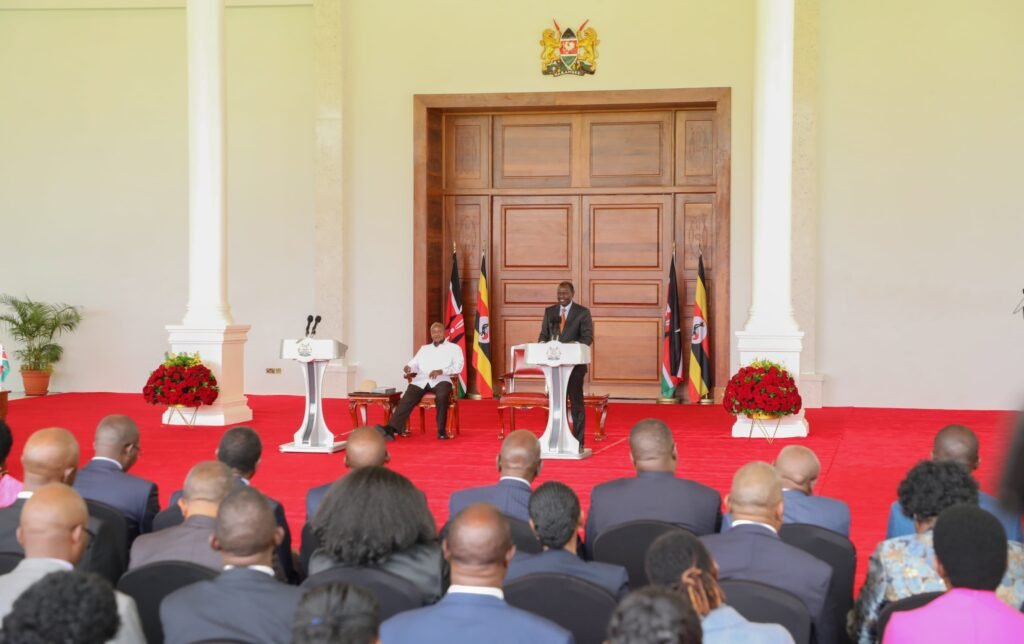Kenya and Uganda on Thursday, May 17, signed an agreement laying out a roadmap for importation and transit of petroleum products through the two countries.
The agreements were signed during a state visit by Ugandan president Yoweri Museveni at State House Nairobi.
Speaking when he hosted the Ugandan president, President William Ruto said the move will enable Uganda to import refined petroleum commodities directly from the producer countries.
“We have just witnessed this agreement which enables the Uganda National Oil Company Ltd to import refined petroleum commodities directly from producer jurisdictions thus bringing to an end the challenges faced by the sector in Uganda,” Ruto said.
Seven other memoranda of understanding (MoU) were signed earlier in the week in Kampala, President Ruto revealed, during the Joint Ministerial Commission meeting ahead of the State Visit.
“We are committed to implementing all our obligations in order for our people and nations to reap the full benefits,” Ruto said.
The two Presidents directed the ministers of trade in both countries to meet and resolve any outstanding barriers affecting trade.
“The meeting also emphasised the importance of extending the Standard Gauge Railway from Naivasha to Malaba and all the way to Kampala and DRC as an efficient and sustainable infrastructure for the transportation of goods,” Ruto said.
He noted that the two East African countries have instructed their respective ministers to take urgent measures and mobilise resources for the implementation of the regional shared infrastructure and report on progress by the end of this year.
“President Museveni and I appreciated the benefits and power of our close coordination with respect to the East African Community, Intergovernmental Authority on Development, the African Union and other regional organisations, which we recognise as the building blocks for the greater integration of our countries at the continental and international levels,” he said.
President Ruto commended the Ugandan leader for the role he has played in regional integration.
“I appreciate, with tremendous gratitude, President Museveni’s contributions and selfless dedication to building a robust East African Community and the plan to transition it into a federation of shared vision and values,” he said.
On the agreements the two governments have signed, President Ruto said: “We now have a memorandum of understanding to anchor cooperation between our Foreign Service institutions which will ensure knowledge exchange and harmonisation of the structures and content of diplomatic training.”
Also signed is an MoU on Cooperation on Public Service Management and Development, whose objective is to enhance
service delivery.
“In addition to these, an MOU to facilitate cooperation in youth affairs has been signed, which enables us to optimise the
capabilities of our youth by obliging the two countries to implement innovative national policies and programmes relevant to young people,” he said.
President Ruto also pointed out that an MOU on cooperation in sports demonstrates the seriousness with which Kenya and Uganda attach to sports promotion, development and the mobilisation of investment to unlock the potential in the sector.
The agreement, he said, is timely as the two countries and Tanzania lay the ground for jointly hosting the 2027 African Cup of Nations.
“Additionally, we have an instrument to guide our strategic cooperation in education, training and scientific research, as well as MOUs in the small and medium-sized enterprises sector, and gender equality and women’s empowerment,” said President Ruto.
On his part, President Museveni emphasised the need for the two countries to eliminate barriers hindering the development of trade.
“We should eliminate barriers which hinder trade not only between Kenya and Uganda, but also East Africa and Africa as a whole,” he said.
President Museveni said the East African Community and, indeed, Africa must deepen free market and modern economic policies for shared prosperity.
“Apart from the economic integration for prosperity, we need to strengthen strategic security through political integration,” he said.


